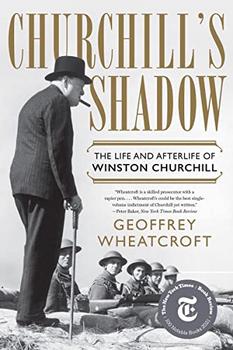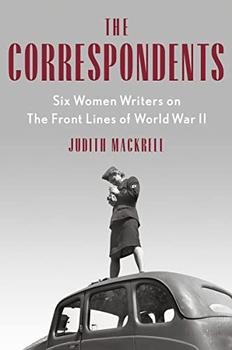Summary | Excerpt | Reviews | Beyond the book | Read-Alikes | Genres & Themes | Author Bio

The Life and Afterlife of Winston Churchill
by Geoffrey WheatcroftAnother book about Winston Churchill? Even with the astronomical number of titles written about the man from every conceivable angle — both pro and con — Geoffrey Wheatcroft miraculously finds new and compelling elements of Churchill's life to engage readers in Churchill's Shadow: The Life and Afterlife of Winston Churchill.
Not a conventional biography in any sense, Churchill's Shadow is rather an assortment of episodes in Churchill's life that reveal not only his actions, attitudes and philosophy, but also how he was viewed by his contemporaries on both sides of the Atlantic. As the word "shadow" in the title indicates, there is an ambivalence surrounding Churchill's impact, and it is this "history of opinions" that Wheatcroft elegantly assembles for the reader. One of the most famous men in British history, his celebrity has ballooned even larger after his death, as Wheatcroft admits early on that "Churchill's posthumous life has become a far more remarkable phenomenon." He explores the prime minister's long shadow with a nonpartisan narrative that elevates and indicts in turn, encouraging readers to judge Churchill for themselves.
There is a multitude of questions that still dog Churchill today, which gallons of ink have been spilled trying to answer. Was he a great politician? Was he that magnificent of a writer? Did he really foresee before anyone else the ominous threat of Hitler and the Nazi Party? Wheatcroft analyzes these questions, providing nuanced answers that usually land within the grey realm of "yes, but." What he can unequivocally say is that Churchill was "a great survivor and a wonderfully successful story-teller." It would be Churchill's words, more than anything else, that cemented his legacy and renown for all time.
One of the dominant threads of Churchill's life that Wheatcroft identifies repeatedly in the book is his fundamental "un-understanding" of people, which manifested in being a bad judge of character. In the years before World War II, Churchill condemned and praised at different times the Italian fascist dictator Benito Mussolini, calling him both "that swine" and "the greatest law-giver amongst men." These types of flip-flops recurred throughout Churchill's life, yet he was heroically consistent in sounding the alarm about the threat of Adolf Hitler and a resurgent Germany — one of his greatest qualities, as Wheatcroft rightly points out. It was this role of prophet that Churchill would later exploit so craftily in his many written works of history and memoir.
Churchill as author and historian is a fascinating feature of Wheatcroft's exhaustive study. For those eyeballing their unread editions of The World Crisis (published 1923, about Word War I) or the mammoth six-volume The Second World War (published 1948-1953 and topping out at 1.63 million words!), illusions might be shattered, as Wheatcroft provides copious evidence of Churchill's use of ghostwriters and research assistants to aid the process. With the publication of The Second World War, Wheatcroft describes how "one reviewer after another bowed down before Churchill's stature not only as a leader but as a writer. And they all believed that this 'great literary achievement' bore the stamp of the man's own hand in every line." The gullibility of the press, especially in America, to believe Churchill wrote books without assistance is puzzling, according to Wheatcroft:
"It occurred to none of these starstruck admirers to wonder whether a man who was still a party leader in a great democracy, while travelling to speak from Missouri to Zurich to The Hague, could really have written such a book unaided."
These books were Churchill's answer to winning the war but losing the peace, Wheatcroft sagely observes. In 1945, having defeated Germany, Great Britain was diminished economically and not "happily placed" to put it mildly. Having lost reelection as prime minister, it would be Churchill's grand command of the English language and his unique position as "lone survivor" of the war (Franklin D. Roosevelt, Hitler and Mussolini had all died, and Stalin was an "enigma" behind his "Iron Curtain") that would help him impose his version of events for posterity. He may have lost the election, but "he now had to win the argument."
Wheatcroft adds to the body of Churchillian studies by commenting on the adoption of Winston Churchill among American neoconservatives like George W. Bush and, indeed, goes into a fascinating discursion on America's love affair with a man Franklin D. Roosevelt didn't really care for. Also of interest are the author's interpretations of other recent Churchill biographies, particularly the ballyhooed and bestselling biography by Andrew Roberts, which Wheatcroft is keen to seize on in his own "contrarian" perspective as an example "of undisguised hero worship, which lengthily extenuated the darker side of Churchill."
With a wealth of resources and razor-sharp wit throughout, Wheatcroft delivers a far more flawed portrait of Winston Churchill, but does so in a way that does not detract from the man's importance in the least. This volume offers a bracingly independent view that should resonate with Churchill fans and foes alike.
![]() This review was originally published in The BookBrowse Review in January 2022, and has been updated for the
May 2023 edition.
Click here to go to this issue.
This review was originally published in The BookBrowse Review in January 2022, and has been updated for the
May 2023 edition.
Click here to go to this issue.

If you liked Churchill's Shadow, try these:

The Mysterious Case of Rudolf Diesel
by Douglas Brunt
Published 2024
The hidden history of one of the world's greatest inventors, a man who disrupted the status quo and then disappeared into thin air on the eve of World War I - this book answers the hundred-year-old mystery of what really became of Rudolf Diesel.

by Judith Mackrell
Published 2023
The riveting, untold history of a group of heroic women reporters who revolutionized the narrative of World War II - from Martha Gellhorn, who out-scooped her husband, Ernest Hemingway, to Lee Miller, a Vogue cover model turned war correspondent.
Music is the pleasure the human mind experiences from counting without being aware that it is counting
Click Here to find out who said this, as well as discovering other famous literary quotes!
Your guide toexceptional books
BookBrowse seeks out and recommends the best in contemporary fiction and nonfiction—books that not only engage and entertain but also deepen our understanding of ourselves and the world around us.